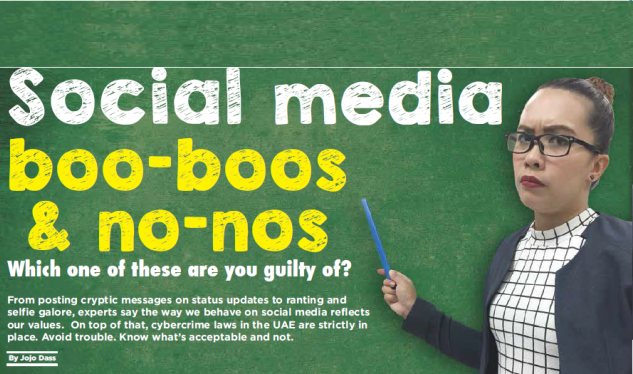Which one of these are you guilty of?
From posting cryptic messages on status updates to ranting and selfie galore, experts say the way we behave on social media reflects our values. On top of that, cybercrime laws in the UAE are strictly in place. Avoid trouble. Know what’s acceptable and not.
DUBAI: Social media have made life extra fun for a lot of reasons. Nowhere in mankind’s history has it been this convenient to stay in touch with everyone. There are curves of course, most especially in matters of dos and don’ts. But as popular American writer, Robert Fulghum, in his New York Times bestseller, said: “Everything you really need to know, you’ve learned in kindergarten.” In a more clichéd manner of saying, there’s no need to reinvent the wheel. Just follow the basics of real-life social ethics and you’ll get there. Below is a quick rundown of the most common social media gaffes you’ve probably come across with at least once in your cyber life – and they can sometimes cause friends to put you in the “hide” list, worse, delete you.
1) Posting cryptic messages.
“Oh no, not again.” “Prayers please. ” “Uuuuugghhh!” are cliffhanger status updates or “vaguebooking” that leave people like “gawking fans,” as The Huffington Post puts it, to the “attention-seeking” author’s delight.
2) Sharing gory pictures.
Who wants to see images of severed heads or a blown-up torso? Here in the UAE, posting pictures of road accident victims is not allowed. The Ministry of Interior has warned the public about this, saying doing so “disturbs families of the deceased and the injured.” It added, “This is also not compatible with the UAE’s customs and traditions, which have been derived from the tolerant Islamic concept. There is zero tolerance for those who are engaged in such behavior.”
3) Ranting, griping.
Sometimes it’s fine to do a little venting – we all get disappointed once in a while. But don’t make it a habit, because if you do, you’d most likely lose FB friends.
4) Selfie galore.
A new study has revealed that posting too many selfies could be annoying to your friends. It says the habit borders on extreme narcissism and could imply an irksome message that you’d like to be the center of the universe. Another study says this habit is actually an indirect way to cover lack of self-esteem.
5) Changing profile pictures often.
“People who keep changing their profile pictures are insecure, lack confidence and are indecisive. Such people are also found to be suspicious and don’t trust others easily. Some even show traits of split personality,” said Dr. Amool Ranjan, a psychologist who had worked for India’s Ministry of Health.
6) Posting a message on an FB friend’s timeline.
An absolute no-no. Most common gaffe of new FB users. You can always go Private Message. Some FB users tweak their privacy settings to avoid this – and the undue embarrassment it could cause.
7) Chain letters.
“If you don’t repost this to your wall and tag five friends, you’ll never find true happiness.” For real?!?
8) Constantly changing relationship updates.
So you were “engaged” then suddenly it became “complicated.” And now you’re in an “open Relationship.” Paired.com says, “Unless you are 12 years old, there shouldn’t be so much drama behind it, but yet there is in the world of dating.”
9) Posting your profile photo taken five years ago.
It’s okay to post your childhood photo or throwback picture, but don’t keep them as your propic for too long. You’d still want your friends to recognize you in person.
10) Candy Crush and other game invites.
Yes, it’s annoying to the point that Facebook boss, Mark Zuckerberg has vowed to stop it.
11) Too much unnecessary posting of food.
Are you a food blogger? Create your own blog page then. Don’t post too much food because it’d sound like you’re bragging or needing attention.
12) Posting intimate photos. Get off it.
It’s probably the equivalent of a pubiic display of affection.
13) Public posting for someone.
Called a “sub-post” and sort of like a blind item posted for someone, a boss maybe, or an ex-lover, even a slob room mate – “I would have loved it if you actually washed your meal plates.”
14) Vacation overkill. Social Times reported that data from CyberLink Corp. suggest you might want to think twice before flooding your News Feed with those vacation photos because most probably your FBFs don’t want an overkill.
15) Security vs Check-ins.
Too much check-ins could put you at risk. If you want to keep your privacy, post it 10 minutes before you leave.
16) Ghost tagging vs Mention.
It’s when a friend tags everyone, including yourself but you’re not in the picture — it would have gone better if you’re mentioned in the caption or comment section.
17) Posting text in all caps.
Writing in all caps is equivalent to shouting – the first rule everyone should know.
18) Emoting on Facebook. This tops the most annoying FB behavior, experts say, adding that it is usually from loners or those with nobody to talk to about their ordeals.
19) Humblebrags and other types of brags.
Waitbutwhy.com says that bragging is “such a staple” that it needs to be broken down to three: the “I am having a great life” brag; Undercover or Humblebrags, and the ‘I’m in a great love affair” brag — and you don’t overuse #blessings, too.
20) Obsessively posting about your child. Okay, all parents love their child but flooding updates about him or her maybe stretching it a bit.
21) Tagging friends in not-so-good pics. It’s called “uncompromising situations” and the poor guy might just end up deleting you.
22) Literal status update. “Headed to the gym.” ‘Beat my deadline.” And so on. Experts say some people post literal updates because they are lonely. You might just want to post it on your twitter, instead.
Extrovert or attention-seeker?
A study has confirmed that there are mainly two types of active social media users: the very extroverted or outgoing, sociable person and those suffering from “attachment anxiety,” or those who worry about not being loved enough, fearing rejection and abandonment.
The second type engage in higher levels of “feedback seeking” on Facebook, said the study’s lead author, Joshua Hart, associate professor of psychology at Union College in New York. A report about the study was published on The Huffington Post last year.
It surveyed some 600 people between 18 and 83. “The feedback that they receive from Facebook can help quell concerns about how loved they are or what other people think of them,” the report quoted Hart as saying. He added, “Compared to more secure people, those higher in attachment anxiety are more feedback sensitive.
They report feeling much better about themselves when they get a lot of comments, likes and other feedback on their posts and worse about themselves when their Facebook activity generates little attention.” In fact, the more active they are on Facebook, the more sensitive anxiously attached individuals may be to feedback.
For this reason, they perceive themselves to receive more attention on Facebook than those who are lower in attachment anxiety, he said in The Huffington Post report. Many Facebook users with over-zealous “friends” may have suspected, excessive statusupdating may sometimes be a cry for attention, Hart said. “There is a robust debate playing out in psychological science and pop culture as to whether Facebook represents a healthy or unhealthy outlet for [emotional and relationship] needs,” said Hart. “I think the jury’s still out on that, but this research suggests that personality is an important factor to consider when investigating the causes and consequences of people’s engagement with social media.”
What the UAE law says
• The laws of the UAE prohibit the publication of content which is contrary to public morals, the principles of Islam and the social and moral welfare of the UAE or any content that is offending for a nation or its government.
• According to the Telecommunications Regulatory Authority (TRA), Facebook users should not tag other users without their consent.
• When tweeting, TRA advises against publishing content contrary to public morals, the principles of Islam and the social and moral welfare of the UAE.
• You must not publish direct, specific threats of violence against others. This also includes hate speeches, and content that is threatening or contains graphic or gratuitous violence.
• You must not publish other people’s private information without their consent.
• Federal Law No. 5 of 2012 on combating cybercrimes considers any deliberate expression which insults or afflicts the dignity or honor of a person a punishable offense.
• Article 21 provides for a punishment of imprisonment of at least six months and/or a fine of AED150,000 to AED500,000 to whoever uses a computer network or and electronic information system or any information technology means for the invasion of privacy of another person:
i) Eavesdropping, interception, recording, transferring, transmitting or disclosure of conversations or communications, or audio or visual materials.
ii) Photographing others or creating, transferring, disclosing, copying or saving electronic photos.
iii) Publishing news, electronic photos or photographs, scenes, comments, statements or information even if true and correct.
• The Penal Code as well as the Cyber Crimes Law prohibit insulting others, or attributing to them conduct that would make them the subject of the contempt. As provided for in Article 21 above, it is not essential that the statement be false for it to be considered defamatory.
• A stiffer penalty of at least one year imprisonment and/or a fine not less than AED250,00 is imposed on violators.
• Disclosing secrets or information pertaining to a person’s private life, without his consent, including tagging or posting his/her picture without consent, is punishable under the Penal Code and the Cyber Crimes Law. This include pictures of road accidents and calamities.
Source: Essential OFW Guide to UAE by Atty. Barney Almazar (Gulf Law)




